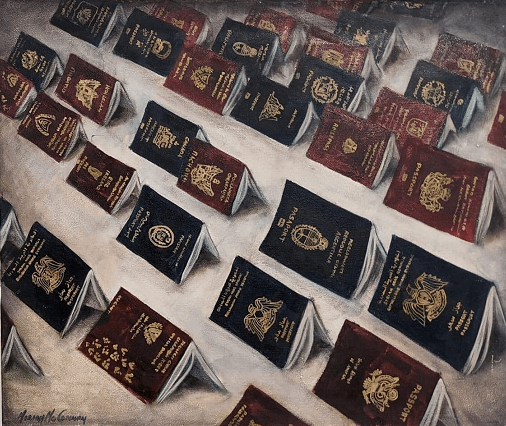Miriam McConnon
'Rows of Passport Tents'
A closer look by Olivier Cornet Gallery curatorial intern Mary Rose Porter
On Wednesday 26 October 2022, Mary Rose Porter, curatorial intern at Olivier Cornet Gallery wrote about Miriam McConnon’s Rows of Passport Tents, oil on canvas, 45x60x4cm.
“In light of Miriam McConnon’s fantastically received public installation Lost Lace at Dublin’s Iveagh Gardens, I decided to take a closer look at the artist’s stylistic and iconographical development through examining her previous work, much of which can be viewed by the public at the Olivier Cornet Gallery in Dublin 1.
Here you can view the exhibition Lost Lace - The Drawings, which has been extended until the 6th of November 2022. In the gallery’s storeroom, which is also open to the public, you can find many of Miriam’s works from previous exhibitions.
In studying these pieces I found there to be a real sense of identity throughout McConnon’s oeuvre, a message of shared experience and strength in community. I focused on the above pictured oil painting, titled Rows of Passport Tents, painted in 2021. This work formed part of a series of paintings produced by the artist for a solo exhibition at the Olivier Cornet Gallery entitled “Displaced Privilege” which took place in the summer of 2021.
This emotive piece captures the gaze of the viewer immediately, as one comes to terms with the poignant and painful message of the work. Rows and rows of international passports cut diagonally across the canvas, creating a pattern of red and blue triangular forms that break up the stark ground upon which they stand. The gilded crests of each nation are delicately outlined, encouraging your eye to delve into the painting and discover its finest details. Each passport is rendered in a unique form, some more bent and worn than others. This individualisation, each form being slightly different in size, shape and treatment, creates a dynamic, engaging and thought provoking experience. One is instantly reminded of the individuals that they belong to, each as unique as the passports they hold.
The title of this work, Passport Tents, conjures up an atmosphere of tension, turmoil and loss. Here the passport motif represents a temporary shelter. For those not in possession of one, the ability to shelter oneself from crisis is vastly hindered by the fact that a safe escape is not possible. The passport, for many, is the key for safe travel and refuge in times of violence and uncertainty. Without one, the chances of refuge diminish, leading people to take desperate measures to flee the danger. These clinical rows of international passports symbolise those individuals who have sought asylum, the personal stories behind them and the ways in which they have been let down. Our attitude towards refugees is one that is considerably divided, and is reflected in their treatment by the respective states they travel to. Temporary accommodation, hostels and direct provision centres are reflected in the tent form of the passports in this work, often providing little more sanctuary than a cold, plastic tent. A poignant reality is reached within the viewer, as they realise the ways in which the most desperate of people, the most deserving of care, have been forced to survive. As you gaze deeper into the shadowy background, there is a sense that these individuals do not have the option to return to what once was their home.”
Mary Rose Porter
Mary Rose Porter
This work is no longer available as it was acquired by the OPW for the State Art Collection in November 2024 (during Dublin Gallery Weekend).

